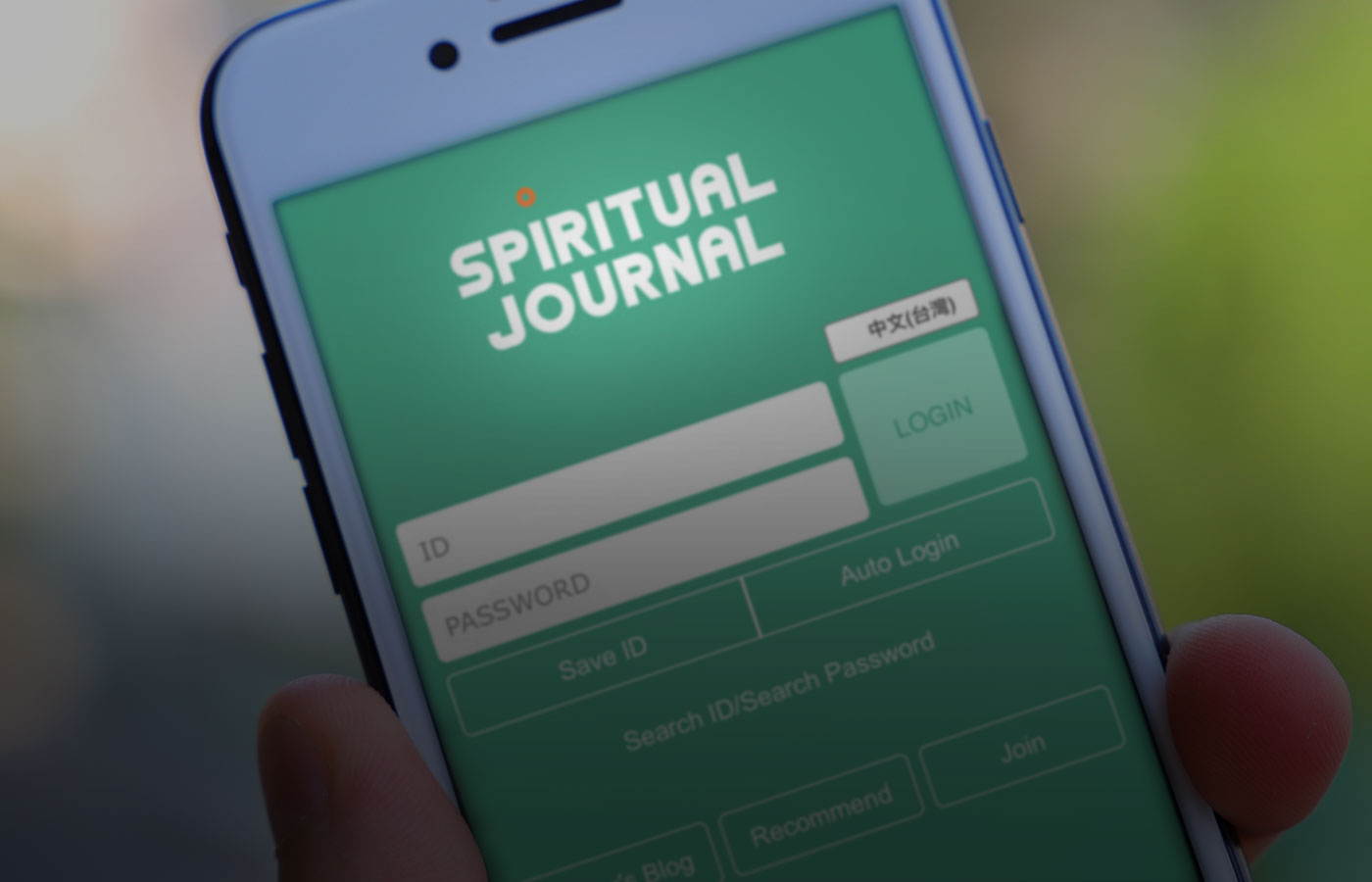The salt lost its saltiness.
Korean churches are facing a crisis; and a discrepancy between faith and life is one of the main causes. The Korean church has achieved tremendous quantitative growth since the 1980s, but there has been too little focus on qualitative growth. It has failed to encourage members to living a distinctive lifestyle, and the salt lost its saltiness. Inconsistency between faith and life has become the main reason for Christians leaving their faith and the church. This inability to find Christlikeness is at the heart of the Korean church’s crisis today and is the reason why the Walking with Jesus Movement (WJM) movement began.
WJM is a rapidly growing movement in Korean and other Asian Churches. WJM aims for people to live every moment with a sense of God’s presence and to enjoy the intimacy with the Lord in daily life. Because of its quintessential purpose and its use of cyberspace, it can be seen as a 21st-century cyber monastery movement.
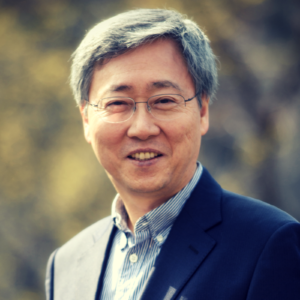
Rev Kisung Yoo, Senior Pastor,
Good Shepherd Church,Seoul
This movement was started by Rev Kisung Yoo, the senior pastor of Good Shepherd Church in Seoul. He asserts that it is possible for believers to experience the presence of the Lord 24 hours a day in their normal mundane life and to enjoy intimacy with him. He uses the spiritual journal as a tool to develop the sense of presence and intimacy with the Lord. Keeping a spiritual journal every day is the most crucial part of the WJM.
WJM origins
Rev Yoo’s belief stems from his own special spiritual experience. It started when he read Frank C. Laubach’s Prayer Diary. Frank Laubach was born in 1884 and was a missionary in the Philippines for 45 years. He did not feel spiritual satisfaction in spite of his long religious life and wondered if ‘living every moment with a sense of God’s presence and feeling its intimacy’[1] were possible.
Then, in 1930, he submitted himself to feeling the presence of God in every moment for one year. After six months of spiritual experiment, he succeeded in grasping God’s presence in each moment. He said, ‘I resolved that I would succeed better this year with my experiment of filling every minute full of thinking of God than I succeeded last year.’[2]

Prayer Diary by Frank C. Laubach
Challenged by Laubach’s spiritual experience, Rev Yoo and his wife, Rebecca Park, conducted a full-scale experiment to sense the presence of the Lord 24 hours a day and feel intimacy with Jesus for a month in 2009, using his sabbatical month.
During the whole month, they gazed upon Jesus from morning until evening and tried to sense the presence of the Lord. Then they wrote how they experienced the Lord in daily life in a diary. This simple writing was the beginning of a spiritual journal. Through the experiment, they started to feel the presence of the Lord deeply and built up intimacy with the Lord that endures to this day. The experience of dwelling in the Lord gave them a tremendous security in the Lord, and resulted in remarkable changes in their lives:
In my youth, I was challenged by the truth that Jesus lives in me. Since that time, the desire for this amazing truth has grown stronger and stronger, constantly seeking and searching for the Lord in me. I began to write a spiritual journal during the journey. Through Frank Laubach, I realized how important it is continually to look upon Him. Looking at Jesus, I have walked with Him at home, at work, and in everyday life and experienced the Lord intimately.[3]
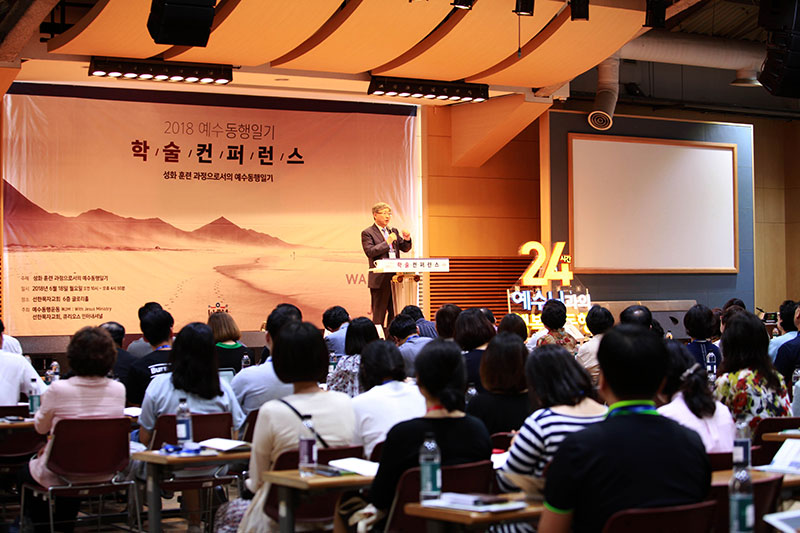
Spiritual journal
Rev Yoo shared his experience with his church members. He developed the spiritual journal into a spiritual development program. The spiritual journal is a simple record of how one thinks about and experiences Jesus in daily life, following four guideline questions in the form of a prayer or a diary:
- When do you think of Jesus in a day?
- How do you feel when you think of Jesus in a certain situation and what happens or changes when you acknowledge him?
- What special things can you remember during the day and how did Jesus work at those moments?
- What has happened when you obeyed (or disobeyed) the promptings of Holy Spirit (Jesus) given to you?
The spiritual journal is distinguished from a personal diary in that one focuses on Jesus’ presence rather than one’s personal life. Through years of spiritual journal ministry within Good Shepherd Church, he confirmed the effectiveness of the spiritual journal. Therefore, he established the WJM to spread the movement broadly.
The spiritual journal has faced criticism from some from a conservative theological background that it does not emphasize the objectivity of the Word of God and that its subjectivity slides into mysticism. However, Rev Yoo is adamant that the Word of God is at the core of the spiritual diary. Some critics also express concern about dualism, the separation of life and spirituality, suggesting that it leads to a lack of social participation, like medieval mysticism. However, this is also a misunderstanding of WJM. The spiritual diary aims to change Christians’ lives as they accompany the Lord in their daily activities.
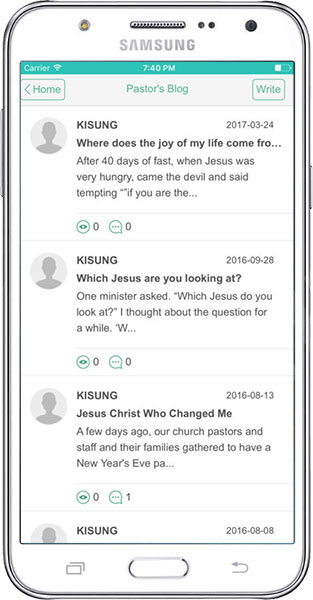
IT importance
A key factor in the growth of the WJM movement was the building of a website and creating a journal writing app. The using of IT in keeping the journal allows people to communicate with others in cyberspace:
- Chatrooms in cyberspace group four to seven people.
- They can share their daily life with the Lord beyond time and space limitations.
The spiritual diary app has also changed the quality of the small group meetings. Because small group members share their everyday life using the app, they can have deeper fellowship in the group. It thus functions as a monastery in cyberspace.
Korean church crisis
Korean churches are facing falling numbers and a wider crisis.
Korean churches are facing falling numbers and a wider crisis. Futurist Choi Yunsik has said:
The feast of the Korean church is over. Not only are Korean churches in spiritual stagnation, but, much worse, they are plummeting. If we do not renew our efforts to cut the bones [work very hard], an 8.7 million Christian population in 2005 will be reduced to 3 or 4 million by 2050, and Sunday schools will be reduced to 300-400 thousand[4].
Korean churches, which experienced a remarkable revival in the last century, are facing a crisis because they have failed to raise disciples who can live the life of Jesus in Korean society:
- The media is full of stories of sexual and financial scandals involving pastors and other Christians.
- They built large church buildings and gathered many crowds, but their lifestyle was not different from the world.
The inability to find Christlikeness is at the heart of the Korean church’s crisis today and is the reason why the WJM movement began.
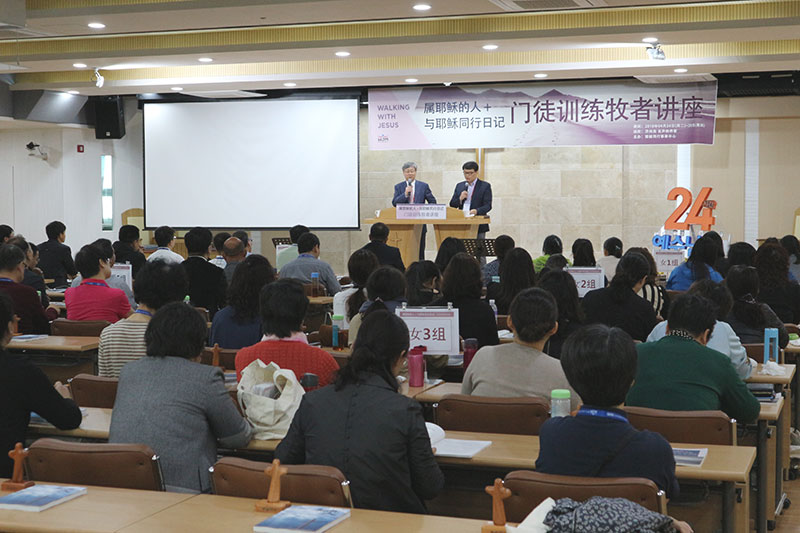
An answer to the challenges of secularization
These problems afflict churches outside Korea too. Asian and other churches have experienced a sharp decline in numbers and a spiritual crisis in the face of secularization. Francis Chan, as a representative of Western Christians, issued a powerful warning to Chinese Christians at the first ‘Mission China Conference’ in Hong Kong in 2015 not to follow the path of the Western Churches, which are losing their spiritual power due to secularization.
The WJM movement can be an answer for the global church to the challenges of secularization.
The WJM movement can be an answer for the global church to the challenges of secularization. It is astonishing news that Christians in Seoul, who live in a highly developed and secularized metropolitan city, have experienced living with the presence of Jesus and enjoying an intimate walk with him in their daily lives.
It is possible to build up Christlikeness in a Christian’s life by living in the presence of the Lord amid a secular society, where money, sex, power, and other personal desires are competing for one’s attention. The spiritual diary is key to this:
The problem of the Korean church is that the pastors neglect the right relationship with Jesus while caring only for the right knowledge of Jesus. We have a lot of knowledge about Jesus. However, it is really shameful that there is no intimacy with Jesus. Korean Christians suffer from spiritual thirst because they do not have intimacy with the Lord. Then they can easily fall into Satan’s temptation of money, sex, and power. The only way to defeat this temptation is to stand on Jesus Christ only. We should not stay in the stage of knowing Jesus well. Rather we should reach the stage of enjoying close and intimate relationship with the Lord. That is why we must continue to develop our sense of knowing the presence of the Lord[5].
By doing this, the WJM movement is also pursuing the original essence of the Christian faith. It is a core teaching that Christ is incarnated and dwells in us. Establishing right relationship with Jesus Christ who dwells in Christians and seeking intimacy with him are the essential means of enjoying our salvation.
It is easy to find movements which sought the presence of the Lord and intimacy with him in early church history. Notably, the monastic movement pursued intimacy with the Lord. David Brainerd, John Wesley, and George Muller used spiritual journals as tools for practising companionship with the Lord. The WJM is not that different from them, but it can be much more effective because of its use of technology.
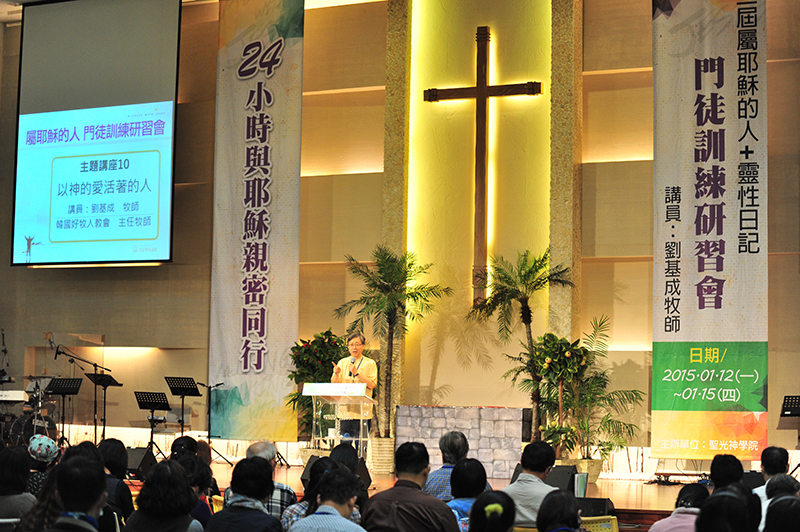
Growing influence
Since the spiritual diary app was launched in November 2010, over 900 churches and 70,000 people in 137 countries have joined the movement. On average, 40,000 people are sharing their journal each day, and journal writers are continuing to grow.
70K
people in 137 have
joined the movement
40K
people are sharing
their journal each day
Rev Yoo’s book, The Spiritual Journal, is now published in Korean, English, Japanese, Chinese, and Indonesian, with Spanish and Portuguese to follow. The WJM occasionally holds spiritual journal conferences, sharing ideas on practical spiritual life and how to walk with Jesus. There have been 20 such conferences in Korea and Asian countries including Taiwan, China, Indonesia, and Japan at the request of churches there.
Now the WJM is developing multilingual websites and apps for the spiritual journal, enabling foreign users such as English and Chinese to write their spiritual diary easily[6].
Outlook
As the first step, the WJM movement sought to renew Korean churches and help them to overcome their moral and spiritual crisis. It has now spread to Korea, Japan, China, Taiwan and Indonesia. In the long run, we are confident that it will spread from Korean and Asian regions to quench the spiritual thirst and hunger of numerous churches around the world.
Implications
The WJM is a fundamental movement of Christianity that seeks the presence of, and intimacy with, Christ in a Christian’s daily life.
The WJM is a fundamental movement of Christianity that seeks the presence of, and intimacy with, Christ in a Christian’s daily life. The spiritual journal, in particular, provides an excellent tool of spiritual discipline that enables Christians to walk with Christ in a secularized society. We are working to enable the blessings of the WJM to become available to the global church.
Specifically, the WJM hopes to serve the global church in cooperation with leaders in the Lausanne Movement. We invite advice and cooperation from Lausanne leadership in order to plan to serve the global church together. We strongly believe that our own journey and experience could be used as a tool to serve thousands of churches worldwide for the glory of Our Lord.
Endnotes
- Renovare, https://renovare.org/articles/living-each-moment-with-a-sense-of-gods-presence-frank-laubach
- Ibid.
- Kisung Yoo, The Spiritual Journal, (WJM Resource), 2. Author’s translation.
- Yunsik Choi, Future Map of Korean Church 2040, 39. Author’s translation.
- Yoo, The Spiritual Journal, 1. Author’s translation.
- Diary with Jesus, http://en.diarywithjesus.com/home?lang=en, Journal with Jesus, http://en.journalwithjesus.org/home?lang=en.
